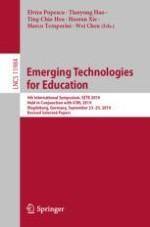2020 | OriginalPaper | Buchkapitel
Reflection of HCI in Foreign Language Teaching
verfasst von : Sarka Hubackova
Erschienen in: Emerging Technologies for Education
Aktivieren Sie unsere intelligente Suche, um passende Fachinhalte oder Patente zu finden.
Wählen Sie Textabschnitte aus um mit Künstlicher Intelligenz passenden Patente zu finden. powered by
Markieren Sie Textabschnitte, um KI-gestützt weitere passende Inhalte zu finden. powered by
